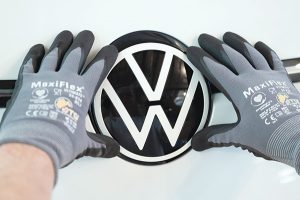More than 70% of the roughly 1 million Porsche 911 sports cars built since the 1960s are still on the road. While one wonders what happened to the others, it shows 911s are prized by collectors and so tend to hold their value. Alas, one can’t say the same about parent company Volkswagen AG’s shares.
Porsche has been touting its strengths ahead of an initial public offering planned for later this year. Owing to its bumper cash flows and big strides in electrification — the battery-powered Taycan already outsells the 911, and Porsche is targeting more than 80% of its car sales to be electric vehicles by 2030 — a valuation of around 80 billion euros ($82.1 billion) looks attainable, according to analysts and my own back-of-the-envelope calculations.
But here’s another eye-catching statistic: The
market capitalisation of Volkswagen, which owns 100% of Porsche, has shrunk this year to less than 80 billion euros, which means the remainder of a group that includes Audi, Lamborghini and Bentley essentially comes for free.
VW aims to leapfrog Tesla Inc in electric-vehicle sales within three years, but even with Elon Musk distracted by his Twitter Inc bid, Tesla is worth more than nine times its German rival. Although VW can’t do much about investors’ recession worries, it must do more to ensure its mastery of software is as great as its mechanical engineering.
To be sure, VW has often sold for less than the sum of its parts, in part due to its wretched corporate governance. Yet selling a 25% stake in Porsche was supposed to help VW unlock value. There’s no sign of that happening yet. Even though the tech bust has taken the air out of near revenue-less auto startups, this hasn’t translated into greater investor appreciation for more established and profitable automakers.
Among its European peers, VW’s shares have declined the most over the past 12 months, and the stock is priced at an abysmal four times forecast earnings.
Some of this weakness likely reflects skepticism that the Porsche transaction will proceed as planned: VW and Porsche remain committed to the fourth-quarter timetable but it’s hardly an ideal moment to pull off one of the largest-ever European IPOs. Last year’s IPO feast has become a famine.
The overly complicated deal structure seems primarily designed to let the Porsche families gain more control over a prized asset, rather than optimise Porsche’s potential valuation, and rising interest rates threaten to inflate their borrowing costs to acquire shares. But I don’t think Porsche is the problem here. VW car sales tumbled more than 25% in the first five months of 2022, a much bigger decline than some rivals suffered. Meeting full-year guidance for a 5%-10% annual sales increase will therefore be challenging, notwithstanding rapidly
improving semiconductor availability and VW’s large backlog of orders.
—Bloomberg
 The Gulf Time Newspaper One of the finest business newspapers in the UAE brought to you by our professional writers and editors.
The Gulf Time Newspaper One of the finest business newspapers in the UAE brought to you by our professional writers and editors.
